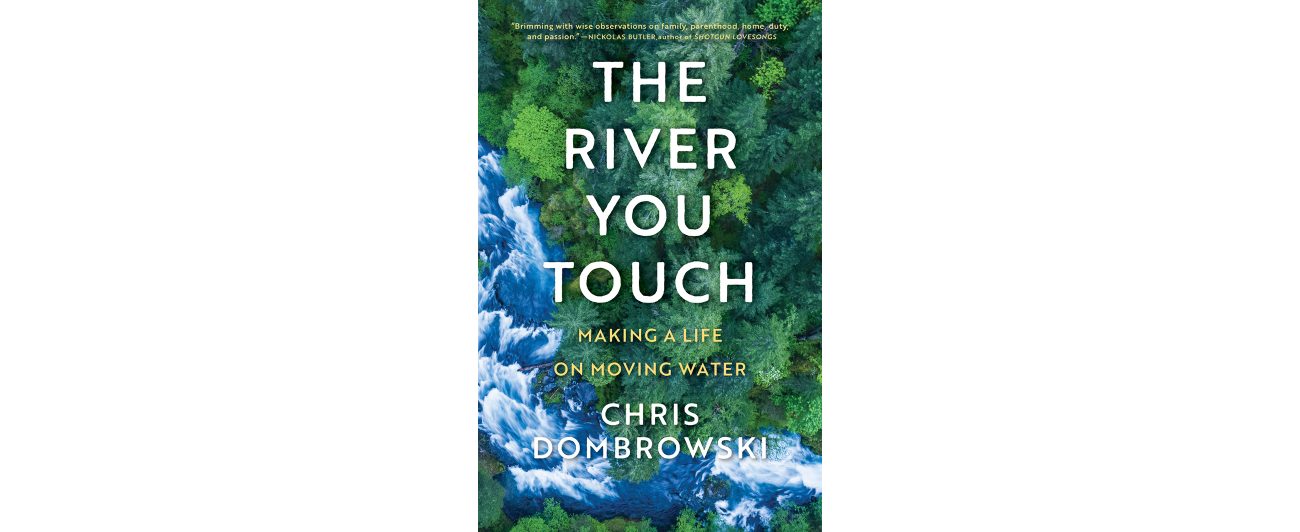Books
Fingers in the Current
On Chris Dombrowski’s The River You Touch: Making a Life on Moving Water
Recently, I took a trip to Missoula to give a talk at the University of Montana. My hosts put me up at the Doubletree Edgewater, right on the river—guest rooms literally steps away from the currents of the Clark Fork. It had been many years since I spent time next to a western river, and when I first walked to the bank I was disgusted: litter everywhere. Except it wasn’t. I had mistaken yellow aspen leaves and red branchlets for plastic refuse and Dorito bags. I normally fish in an urban bayou in New Orleans, where consumer trash is everyday structure for bass and sunfish. As I stood by the river, the rhythms and textures returned like old friends: the scent of cottonwoods and dogwoods, the curvature of water-worn rocks underfoot, the sounds of riffles turning mirror smooth…the sensations encompassed me and made me feel strangely at home, even though I’d never spent time on these exact shores, before.

Reading Chris Dombrowski’s new book, The River You Touch: Making a Life on Moving Water, which by coincidence was written near and around this very place, I felt something similar. Dombrowski’s prose is familiar and inviting, even if the stories are new. Dombrowski infuses his narrative with the epiphanies and predicaments that many readers will identify with if they too have attempted to make a life in proximity to water. It sounds obvious as I write this, but it’s a subtle craft, this translation of outdoor commitment onto the page, extending leaves of solidarity to audiences unknown.
Flyfishing plays into The River You Touch in indirect ways, yet always with a vibrant intensity that the dedicated flyfisher will register. Tiny hand-tied trout flies are gifted to friends in exchange for ad hoc carpentry work on Dombrowski’s soon-to-be-fuller house. An epic float with the writer Jim Harrison commingles streamer fishing and a plump hooked brown with existential musings, tall tales and legendary meals. Trout are often seen, only to be left alone.
I hadn’t brought a fly rod on my trip to Missoula, as my schedule was fairly packed. But there were “decompression” hours between meetings and meals. And there was the river, teasing me. So, of course I sprinted into town during one of my first off hours, and the good folks at the Missoulian Angler sold me a rod outfit and gave me a complimentary box of flies. I fished and fished whenever I had an hour off in the afternoons and in the mornings before my activities began. I caught a nice rainbow on my last morning in town, on a streamer I twitched past some submerged boulders. For all my flailing, I had—for a few moments—succeeded at something. At one point I simply put my hand in the water, and let it run through and over my fingers. I felt something sublime, if low-grade and utterly fleeting.
As I flew out a few days later—enduring a mechanical delay, a missed connection and an unplanned overnight in Denver followed by an ungodly early reroute through Houston—I cradled my new rod case: we had bonded, back there by the river. And this fubar journey was part of my impromptu flyfishing adventure. It’s theses same pauses and intermissions that Dombrowski nails so lucidly in his book. It’s the relatable (sometimes excruciatingly so) times between the action, the questions and humility in the face of a bigger world, that make A River You Touch so hard to put down.
Flyfishing phases throughout Dombrowski’s book. It will recede into the background for pages and pages and then pop out, a vivid experience or association once again. A shot pheasant’s feathers will become flies for later use; the backside of a piece of ponderosa bark reminds the author of a brook trout’s vermiculated patterns; a steelhead spotted after a long dry-spell, perfectly situated for a precision cast, becomes something to behold rather than hook, because of the author’s present mindset; guided trips are experiences not just for catching fish but for cultivating deep friendships. Flyfishing, in other words, is realistically rendered in The River You Touch: it’s not always (or only) a focused activity, but instead scatters out to the odd ends of ordinary life—and loses focus, too.
This book is a triumph in part because of Dombrowski’s own admitted suspicion of the genre of memoir. Relentlessly hyper-aware and self-critical, the prose paints beautiful scenes, domestic as well as wild, only to point out their artifice and contrivances. Still, the beauty remains. Just when you think the story is settling into a certain rhythm, it slips course—and the rapids begin. The book starts pulling the reader faster and faster down a chute toward bigger waves and unseen obstacles and you have to keep reading to learn how it all washes out.
My experience reading A River You Touch is entangled with my serendipitous visit to Dombrowski’s home turf, and while I barely had time to fish there, and only minimally touched that river, as I read the book the layers of this profound yet mundane habit were made plain. Touching water: it should be a simple Zen practice, but it has gotten complicated in the 21st century, what with the perils of ecological collapse due to anthropogenic climate change as well as general cultural unravelling. Back in New Orleans, I found my own daily life placed in sharp relief alongside Dombrowski’s narration. Here I was fishing a disgusting urban bayou, finding my footing casting for ladyfish while simultaneously losing my mind. How did I get here? What’s going to happen next? Where does one go for peace in a world under siege?
The River You Touch doesn’t provide answers, except maybe get back to the river. But Dombrowski sure offers commiseration—real solace achieved through earnest communication. Like that perfect cast that you watch happening as if in slow-motion, appreciating it fully while knowing that it can’t last. And neither should it, if it is to be made in the first place.
For more of Chris Dombrowski’s work and to grab a copy yourself, visit: https://www.cdombrowski.com/the-river-you-touch
Christopher Schaberg is an English professor at Loyola University New Orleans and the author of several books including Fly-Fishing, publishing in March 2023.
